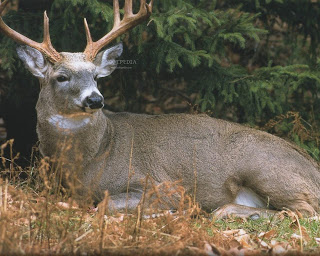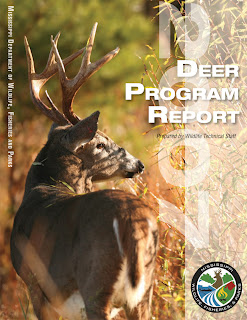 DEER:{{{}}}
DEER:{{{}}}A deer is a ruminant mammal belonging to the family Cervidae. A number of broadly similar animals from related families within the order Artiodactyla (even-toed ungulates) are often also called deer. Male deer of all species, except the Chinese water deer, grow and shed new antlers each year, as opposed to horned animals such as antelope—these are in the same order as deer and may bear a superficial resemblance, but they are permanently horned. The Musk deer of Asia and Mouse Deer or Water Chevrotain of tropical African and Asian forests are not true deer and form their own families, "Moschidae" and Tragulidae, respectively. All other animals in Africa resembling deer are antelope.


Etymology:[][][]
The word deer was originally quite broad in meaning, but became more specific over time. In Middle English, der (O.E. dēor) meant a wild animal of any kind (as opposed to cattle, which meant any domestic livestock).[1] This general sense gave way to the modern sense by the end of the Middle English period, around 1500. The German word Tier, the Dutch word dier, and the Scandinavian words djur/dyr/dýr, cognates of English deer, still have the general sense of "animal". The adjective of relation pertaining to deer is cervine.
For most deer, the male is called a buck, the female is a doe, and the young is a fawn. However, large deer (elk, moose, caribou) are named as if they were cattle, that is, bull, cow, calf. A group of deer is commonly called a herd. Hart, from Old English heorot "deer", is an alternative term for a stag, particularly a Red Deer stag past its fifth year (compare with the modern Dutch word hert meaning deer). The county Hertfordshire is named after a place where deer ford a watercourse. The word hart is not commonly used, but Shakespeare makes several references, punning on the sound-alike "hart" and "heart", for example in Twelfth Night. "The White Hart" and "The Red Hart" are common English pub names. Whinfell Forest once contained a landmark tree called Harthorn.[2] The word "Hart" also exists in Saterfrisian, being a synonym for the Word "Hirsk" which is more similar to the German Word "Hirsch".

The word deer was originally quite broad in meaning, but became more specific over time. In Middle English, der (O.E. dēor) meant a wild animal of any kind (as opposed to cattle, which meant any domestic livestock).[1] This general sense gave way to the modern sense by the end of the Middle English period, around 1500. The German word Tier, the Dutch word dier, and the Scandinavian words djur/dyr/dýr, cognates of English deer, still have the general sense of "animal". The adjective of relation pertaining to deer is cervine.
For most deer, the male is called a buck, the female is a doe, and the young is a fawn. However, large deer (elk, moose, caribou) are named as if they were cattle, that is, bull, cow, calf. A group of deer is commonly called a herd. Hart, from Old English heorot "deer", is an alternative term for a stag, particularly a Red Deer stag past its fifth year (compare with the modern Dutch word hert meaning deer). The county Hertfordshire is named after a place where deer ford a watercourse. The word hart is not commonly used, but Shakespeare makes several references, punning on the sound-alike "hart" and "heart", for example in Twelfth Night. "The White Hart" and "The Red Hart" are common English pub names. Whinfell Forest once contained a landmark tree called Harthorn.[2] The word "Hart" also exists in Saterfrisian, being a synonym for the Word "Hirsk" which is more similar to the German Word "Hirsch".



No comments:
Post a Comment